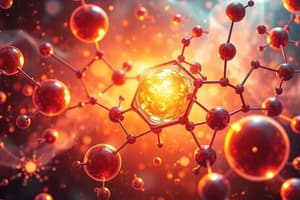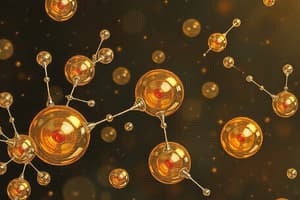Podcast
Questions and Answers
What is the stable, three-dimensional structure formed when two or more atoms covalently bond together?
What is the stable, three-dimensional structure formed when two or more atoms covalently bond together?
- Element
- Compound
- Isotope
- Molecule (correct)
How are elements organized in the periodic table?
How are elements organized in the periodic table?
- Atomic volume
- Atomic number (correct)
- Atomic radius
- Atomic mass
What do compounds consist of?
What do compounds consist of?
- Different elements (correct)
- Same elements in different periods
- Same elements in the same group
- Different isotopes
What fundamental principles do chemical reactions follow?
What fundamental principles do chemical reactions follow?
Which field relies on chemistry for developing new therapeutic approaches and designing advanced medical devices?
Which field relies on chemistry for developing new therapeutic approaches and designing advanced medical devices?
What is the smallest unit of an element that retains its properties?
What is the smallest unit of an element that retains its properties?
Which particles determine an atom's chemical reactivity?
Which particles determine an atom's chemical reactivity?
What is the scientific discipline concerned with the structure and properties of matter?
What is the scientific discipline concerned with the structure and properties of matter?
Which particles are responsible for the element's atomic number?
Which particles are responsible for the element's atomic number?
In chemistry, what do atoms combine to form?
In chemistry, what do atoms combine to form?
Flashcards are hidden until you start studying
Study Notes
Chemistry
Chemistry is the scientific discipline concerned with the structure, behavior, composition, and properties of matter and the changes it undergoes. It encompasses a wide array of subject areas, ranging from atomic and subatomic levels to bulk matter and solutions. This field is crucial in understanding the fundamental nature of the physical world, providing insights into the relationships between different forms of matter and their reactions.
Fundamentals of Chemistry
Atomic theory posits that all matter consists of discrete units called atoms, which combine to form molecules. These atoms have specific numbers of protons, neutrons, and electrons, determining their unique properties and behavior. Elements like hydrogen, carbon, oxygen, and others consist entirely of one type of atom, while compounds like water (H2O), sugar (C12H22O11), and salt (NaCl) contain multiple atoms.
Atoms and Molecules
An atom is the smallest unit of an element that retains its properties. It consists of three main parts:
- Protons: Positively charged particles found in the nucleus of an atom. They are responsible for the element's atomic number.
- Neutrons: Neutral particles also located within the nucleus. The number of neutrons affects an element's isotope distribution.
- Electrons: Negatively charged particles orbiting the nucleus in shells or energy levels. They determine an atom's chemical reactivity.
When two or more atoms covalently bond together, they form a stable, three-dimensional structure called a molecule. For example, a water molecule (H2O) contains two hydrogen and one oxygen atom, each sharing electrons in pairs to create the overall structure.
Chemical Elements and Compounds
The periodic table organizes all known chemical elements based on their atomic structure, revealing patterns in their properties. An element's position in the table reflects its atomic number (number of protons), atomic weight (sum of protons + neutrons), and group membership. Elements within a group share similar properties, while elements in the same period have increasingly complex atomic arrangements.
Compounds consist of atoms from two or more elements combined in a specific proportion. Examples include water (H2O), sodium chloride (NaCl), and carbon dioxide (CO2). The formula of a compound represents the number of atoms of each element it contains.
Chemical Reactions
Chemical reactions involve the rearrangement of atoms to form new molecules. They occur when reactants collide with sufficient kinetic energy to overcome activation barriers, resulting in product formation. These reactions follow fundamental principles such as conservation of mass and charge, and they often release or absorb heat. Common types of chemical reactions include synthesis (combination of reactants to create products), decomposition (separation of reactants into simpler components), single replacement (substitution of one atom in a compound with another), and double displacement (replacement of two atoms in a compound with others).
Applications of Chemistry
Chemistry has vast implications in various aspects of our lives, from everyday products and materials to advanced technologies and scientific understanding. Some key applications include:
Medicine and Pharmaceuticals
Understanding chemistry is essential for developing drugs and treatments, determining drug mechanisms, and designing new therapeutic approaches. Advanced medical devices, imaging techniques, and diagnostic tools also rely on chemical principles.
Energy and Environment
Chemists explore ways to generate sustainable energy sources, store clean fuels, and mitigate environmental pollution. Research focuses on creating efficient solar cells, optimizing battery performance, and enhancing greenhouse gas capture.
Materials Science and Engineering
Chemistry informs the design and production of engineered materials like polymers, ceramics, alloys, and composites. These materials have diverse applications, ranging from construction materials and electronics to aerospace engineering and medical implants.
Food and Agriculture
Agricultural practices involve extensive knowledge of plant growth and soil chemistry, enabling researchers to select fertilizers, pesticides, and crop varieties that optimize nutrient uptake and minimize environmental damage. Additionally, food processing relies on chemicals to preserve freshness, alter taste, or package products safely.
In conclusion, chemistry is a fundamental discipline that touches upon virtually all aspects of our existence, revealing the intricate connections between matter and its transformations. Chemical concepts guide our understanding and manipulation of the world around us, shaping technological advancements, environmental stewardship, and societal prosperity.
Studying That Suits You
Use AI to generate personalized quizzes and flashcards to suit your learning preferences.




